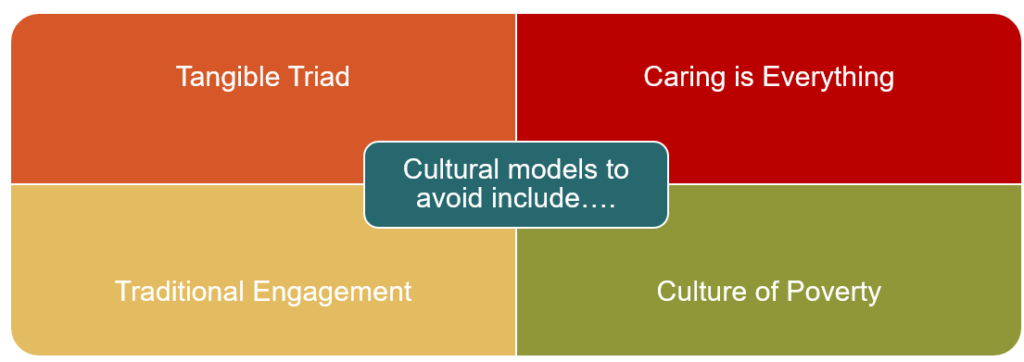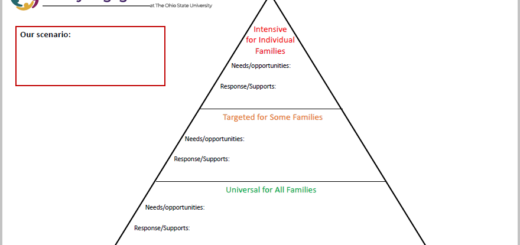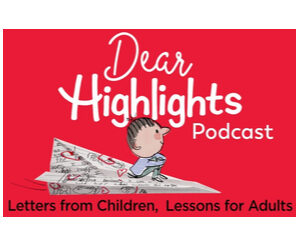Reframing Family Engagement: Communication Examples

What are Cultural Models?
Cultural models are shortcuts our brains take to help us understand information. They are the assumptions and beliefs we create through years of experience and expectations. They help us to interpret, organize, and make meaning of our experiences and help us to structure our thinking about experiences. We use cultural models all the time, often when we are unaware, but some of them can prevent us from thinking about issues in productive ways and might even cause us to tap into our own implicit bias.
Below are some examples of how to reframe your communications away from some of the cultural models we know negatively affect the way people think about family engagement. We are grateful to our Reframing Academy 2022 participants for inspiring us to share these participant-generated examples, and to Sherri Wilson from NAFSCE for helping to create this resource.
How can I reframe the “Tangible Triad”?
The tangible triad is when people mistakenly assume that the only relevant people to talk about when it comes to education are teachers, parents, and students. In reality, it takes a village to raise a child. Caregivers, extended family, neighbors, school support staff, community organization staff, siblings…they ALL have a role to play. How are we valuing and welcoming partnership with the people in a child’s village who play these important roles?
Try these types of statements:
- Educating our kids is like Mission Control for a space launch. Just like a space launch needs astronauts, mathematicians, physicists, and others to take off, we need families, schools, and community partners to work well together to launch students to their best and brightest futures, no matter how much gravity they encounter.
- Every caring adult in a child’s life has a role to play in that child’s development and level of achievement- beyond just teachers and parents. Bus drivers, custodians, shopkeepers, neighbors…everyone has a role to play.
- There are many more players involved in a child’s educational experience than meets the eye; it is only when teachers, students, families, schools, and communities work together that a child can truly thrive.
- Students achieve better academic and social-emotional outcomes when caring adults (families, community leaders, school/district staff) work together.
- The knowledge, wisdom, assets, love, gifts, and talents of everyone in the community are vital to the development, success, and overall well being of our children.
How can I reframe “Caring is Everything” or “Some families just don’t care”?
Try these types of statements:
- I used to think some families don’t care, I really did, but now I know that the expectations I had that busy, working families, families with multiple kids, that everyone would come to my building during dinner time on a weeknight were really, if you think about it, not convenient or realistic. And I try to operate differently so any family can benefit from a partnership with me. There are so many ways I can communicate back and forth with my students’ families.
- Engagement is more than just “caring,” it is about collaboration and working together to promote student success and it involves more than just the families and their teachers but all the systems students are involved in.
- It’s easy as a parent to assume a teacher doesn’t care, and that’s why they aren’t reaching out to talk to you about what’s going on with your child. It’s much more likely that one or more of these 3 things are going on: 1) the teacher has no background or professional learning on how to communicate back and forth on a regular basis with families, and/or 2) they don’t have much direction or support from the school’s leadership to carve out time and space to talk with families, and/or 3) they are a little nervous to talk to you, so they are putting it off.
- Teaching is called a caring profession for good reason. This trap is easy to fall into. I would say: all families care about their students. Their way of expressing it may differ from your expectations, and there are many reasons they may not show up in the way the school sets for them to “prove” they care.
How can I reframe “Traditional Engagement”?
Try these types of statements:
- Family engagement is more than just a parent/teacher conference or sending a letter home, it is creating relationships between all of the important players in a child/student’s life to set them up for success and create a long term dimensional relationship between school and home.
- I’ve been really impressed with learning about what some other schools are doing to partner differently with families and community organizations. Did you see what _____ is doing? That’s really cool. I think it would take some pressure off our teachers if they knew that ____ was able to provide that support for our students/families. Would you support me in reaching out to them for more information about how they made that work?
- Family engagement is varied and is an ongoing partnership with the school community that engages families in decision-making and empowers families to be advocates for the academic success and well-being of the child.
- Many hands make light work. Consider this message to families and communities and the feedback and input we might receive: “We are so excited to share current happenings with you and get your input on future opportunities. The students explored and discovered… about … Please ask a student to share their learning with you. Please let us know what they learned from the experience and how it could be improved in the future. What would be of interest for our next experience? How would you like to contribute to the learning? Thank you for partnering with us.”
How can I reframe “Culture of Poverty”?
Try these types of statements:
- I can understand why our services or events aren’t the biggest priority sometimes, especially if we only have one way that families can be engaged and we aren’t really giving families much of a chance to develop a relationship with our staff. Just because some parents can’t attend parent-teacher conferences or open houses does not mean they don’t value education. Let’s think outside of the box! How could we make sure that all families can get the same information and feeling of relationship-building we provide at an in-person parent-teacher conference?
- I understand that it seems like they don’t care if they aren’t able to show up or respond when we send a letter. On the other hand, working different hours or multiple jobs is not synonymous with being disengaged or not caring. Let’s ask them what time is best for them to have a quick conversation so we don’t lose that chance to get their input. Who seems to know this family best? Maybe they can help us get in touch with ____’s family.
- I talked to ______’s parents the other day when they came to pick up ______, and they told me they are going fishing next week, and that they go every year. I know several families who do the same. I wonder how we can build their interests and other families’ interests into our classroom conversations this school year with students, and maybe there could be opportunities for families to come in and talk to the kids about their skillsets.
- Simply because a family may live in poverty has nothing to do with how they value education.
- Everything a child is learning about the world through their families is a part of their education. Valuing education may look different in each family but that does not mean that they devalue it.
- We value all families getting involved with their student’s education. We know that when students feel supported at school and at home, they have better outcomes. Please let us know how you would like to be involved in your child’s education (list ways to get involved and leave other option to fil in).
- Transportation is an issue in this community, so many families do not have a reliable way to get to the school even if they want to. We should think about providing bus passes or other ways to meet them where they are. There are also several parents working during the hours that you are trying to hold events, this is why it is important to get to know the families that you work with, so you can better understand and support them. It is crucial that we, as family engagement personnel, think about the barriers our families face and do our best to reduce those barriers.
- All families want their children to succeed. Let’s talk to families and ask what barriers we can remove to allow more families to engage.
- When we make an assumption that families in lower economic situations are not interested we give ourselves an out…we want to be committed to helping all of our students succeed by doing things we can control and impact.



